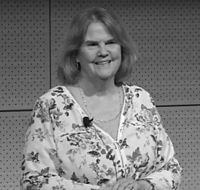Diane Larsen-Freeman facts for kids
Quick facts for kids
Diane Larsen-Freeman
|
|
|---|---|

Diane Larsen-Freeman
|
|
| Born | 24 February 1946 |
| Alma mater | |
| Known for |
|
| Spouse(s) | Elliott Freeman |
| Children | 2 |
| Scientific career | |
| Institutions |
|
| Thesis | The Acquisition of Grammatical Morphemes by Adult Learners of English as a Second Language (1975) |
| Doctoral advisor | H. Douglas Brown |
Diane Larsen-Freeman (born in 1946) is an American linguist. This means she is an expert who studies language. She is a special kind of professor called a Professor Emerita at the University of Michigan. She is known for her work in how people learn a second language. She also studies how to teach English to people who speak other languages. Her ideas have greatly influenced how we understand language learning.
Contents
Diane Larsen-Freeman's Career Journey
Diane Larsen-Freeman started her career helping others. From 1967 to 1969, she was a Peace Corps volunteer. She taught English in Sabah, Malaysia. This experience made her very interested in how people learn languages.
Education and Early Teaching Roles
After her time in Malaysia, she went back to school. She studied at the University of Michigan. In 1975, she earned her PhD in linguistics. After that, she taught at the University of California, Los Angeles. She also taught at the SIT Graduate Institute.
Leading the English Language Institute
In 2002, Diane Larsen-Freeman returned to the University of Michigan. She became the director of the English Language Institute (ELI). This institute helps people learn English. She also became a professor in the School of Education. She taught in the Department of Linguistics too. She stopped directing the ELI in 2008. In 2012, she retired from the University of Michigan. She still holds special "emerita" positions there. She also has an emerita position at the SIT Graduate Institute.
Continuing Her Work Today
Even after retiring, she stays very active in her field. She teaches courses at the University of Pennsylvania Graduate School of Education. These courses are about how English is structured. She also teaches about how people learn a second language.
Understanding Language Learning
Diane Larsen-Freeman's main research focuses on how people learn a second language. She also studies English grammar. She believes grammar is not just rules. It's a way to make meaning. It helps people use language in different situations.
The Dynamic Approach to Language
She uses something called "complexity theory" in her research. This theory helps her understand language better. She sees language, learning, and using language as dynamic processes. This means they are always changing. They are not simple or straight-forward. This idea led to her "dynamic approach" to language. She even calls teaching grammar "grammaring." This shows it's an active process. This approach also recognizes that each student learns in their own way. It views teaching as guiding students in their learning journey.
Editor of Language Learning
For five years, Diane Larsen-Freeman was the editor of the journal Language Learning. This is an important publication in her field.
Recognitions and Awards
Diane Larsen-Freeman has received many honors for her work.
- Kenneth W. Mildenberger Prize (2008): She won this award with Lynne Cameron. It was for their book Complex Systems and Applied Linguistics. The Modern Language Association gave them this prize.
- Distinguished Scholarship and Service Award (2011): The American Association for Applied Linguistics gave her this award. It recognized her excellent research and service.
- 50 at 50 Leader in TESOL (2016): The TESOL International Association chose her as one of their top leaders.

